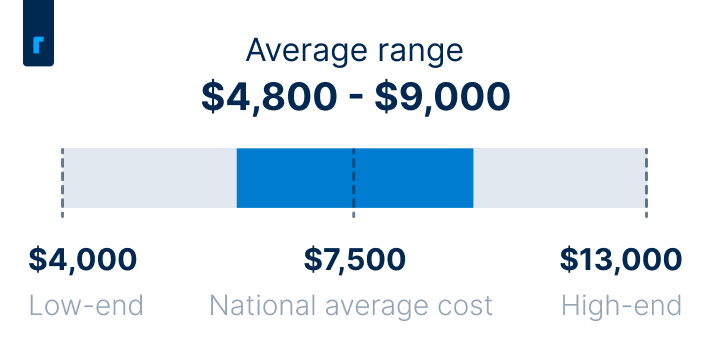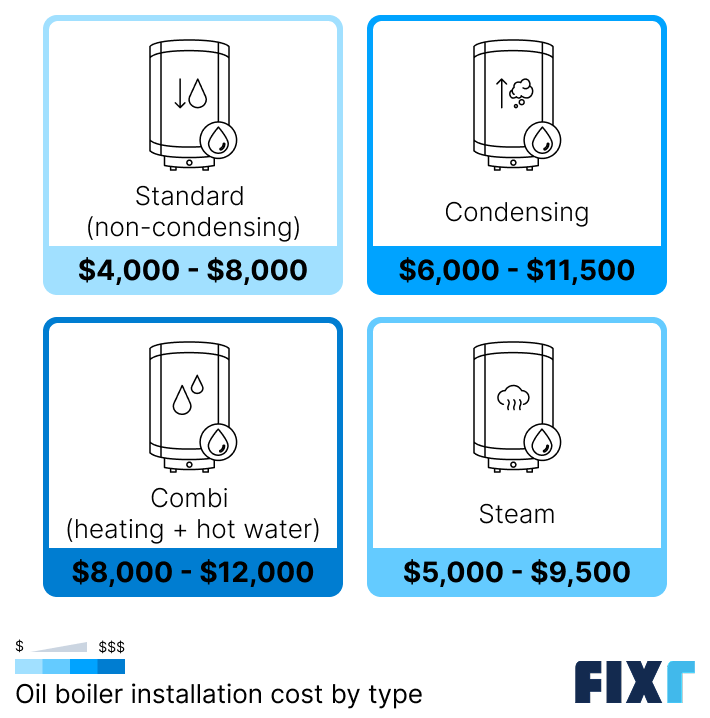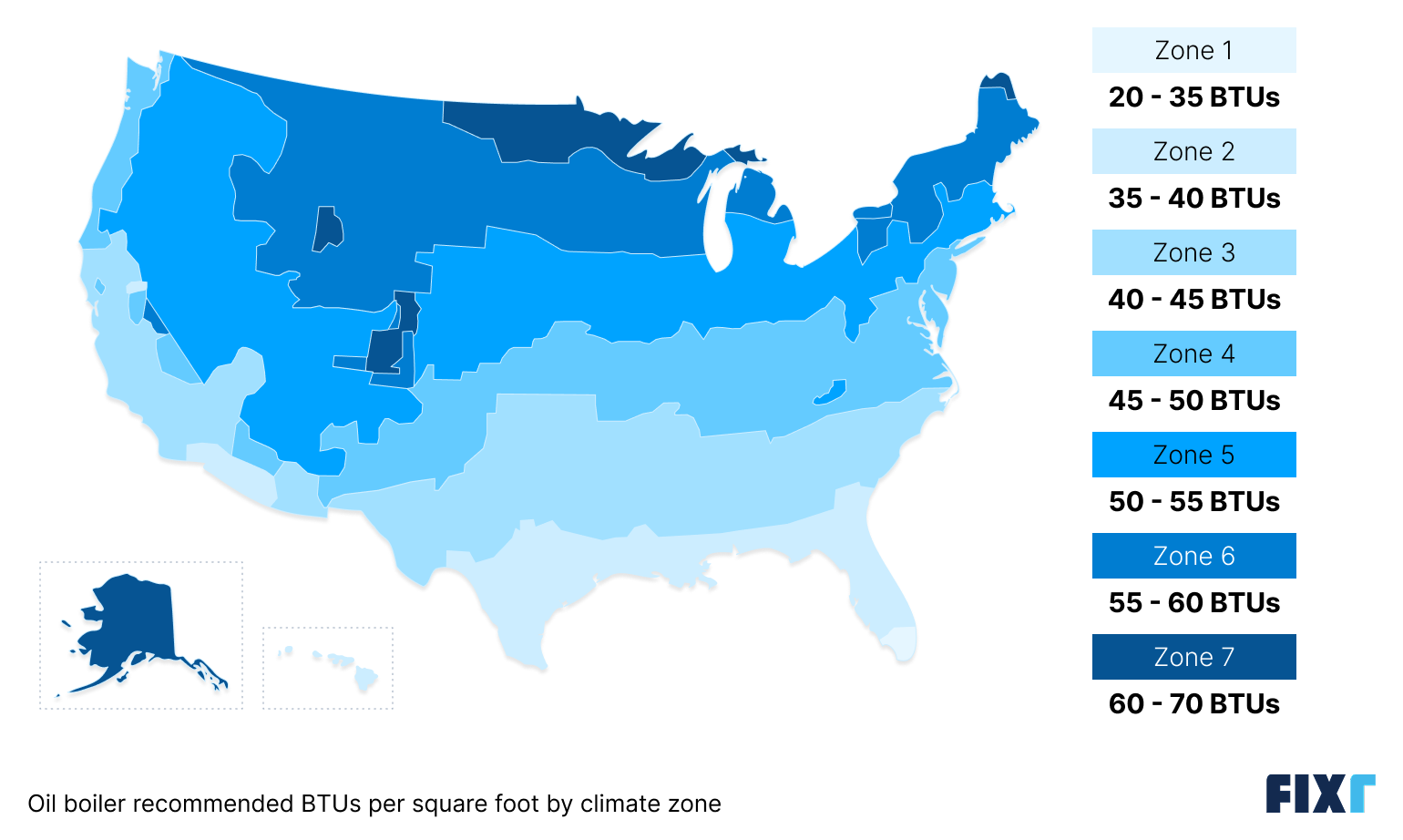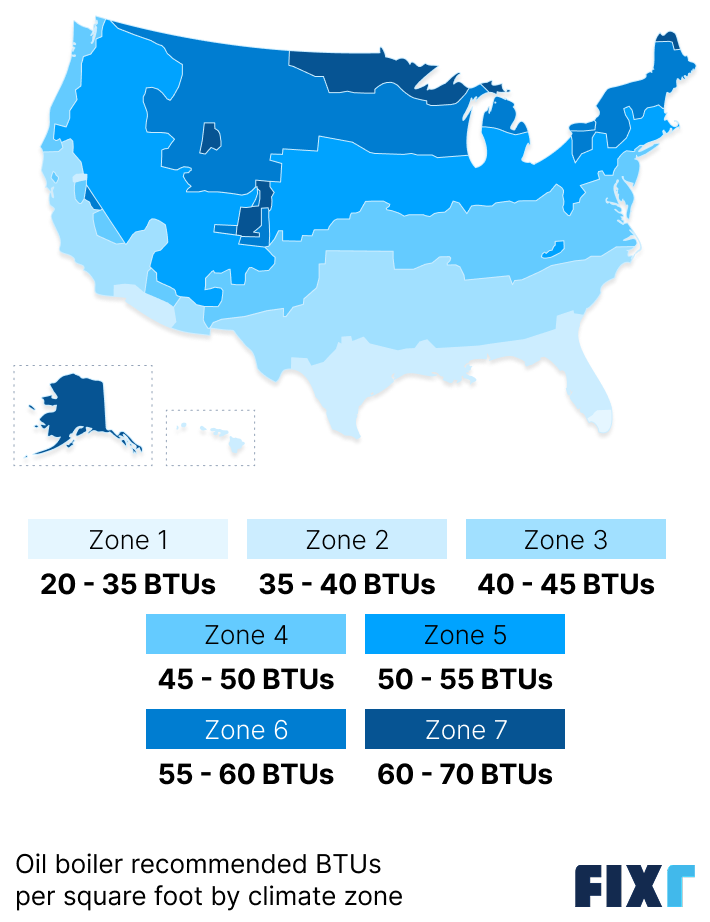Updated: January 26, 2026
Written by Nieves Martinez
Laura Madrigal is the Home Design Specialist at Fixr.com, dedicated to identifying and analyzing significant changes within residential design. She is the author of leading trends reports on interior design, kitchen, and bathroom, and her insights have been featured in publications like Realtor and the New York Post.
Learn moreReviewed by Laura Madrigal
The average cost to replace an oil boiler is $7,500, with most homeowners spending between $4,800 and $9,000. Prices can range from as little as $4,000 for a standard-efficiency model to as much as $13,000 for a high-efficiency model that requires system upgrades.
If you live in an area without access to a gas line for natural gas, an oil boiler can be an effective way to heat your home. These boilers use heating oil stored in a tank on your property to heat water or create steam, which is then circulated through radiators or radiant flooring.
Oil Boiler Replacement Cost


Oil Boiler Installation Cost by Type
The type of oil boiler you install has a major impact on the total cost, efficiency, and performance. Oil boilers come in several types, each with its own price range, efficiency rating, and best use case. Standard models are usually the most affordable, while condensing and combi boilers cost more upfront but can save money on fuel or space.


Type | Average Cost (Installed) |
Standard (non-condensing) | $4,000 – $8,000 |
Condensing | $6,000 – $11,500 |
Combi (heating + hot water) | $8,000 – $12,000 |
Steam | $5,000 – $9,500 |
Standard (Non-Condensing)
A standard oil boiler typically costs $4,000 to $8,000. These are the most common and affordable models, with efficiencies around 85% to 90%. While they waste more energy through exhaust, they are durable and often last up to 25 years.
Condensing Oil Boiler
Condensing oil boilers fall in the $6,000 to $11,500 range and can achieve efficiencies of up to 95%. They capture heat from exhaust gases that standard models lose, making them significantly more fuel-efficient. While they have a higher upfront cost, they can lead to significant long-term fuel savings. They are built with a stainless steel heat exchanger to resist the acidic condensate they produce, but typically last around 15 years.
Combi (Combination) Oil Boiler
A combi boiler costs between $8,000 and $12,000. This type of oil boiler provides both space heating and domestic hot water in a single compact unit. They are ideal for smaller to mid-sized homes, saving space by eliminating the need for a separate water heater.
Steam Oil Boiler
Replacing a steam oil boiler generally runs $5,000 to $9,500, with average ratings of 85% efficiency. Primarily used in older home heating systems with existing steam radiators, these boilers are typically less efficient and bulkier than modern hot water boilers.
Oil Boiler Cost by Home Size
The size of your home affects the oil boiler you need and the overall installation cost. Larger homes require boilers with higher BTU ratings, which can raise both the unit price and installation costs. These estimates are based on homes with average insulation and typical heating needs.
Home Size | Recommended BTUs | Installed Cost Range |
1,000 sq.ft. | 40,000 | $4,000 – $6,200 |
1,500 sq.ft. | 60,000 | $5,000 – $7,500 |
2,000 sq.ft. | 80,000 | $6,500 – $9,800 |
2,500 sq.ft. | 100,000 | $7,600 – $13,000 |
3,000 sq.ft. | 120,000 | $9,000 – $16,000 |
What Size Oil Boiler Do I Need?
Choosing the right oil boiler size is essential for comfort, efficiency, and long-term performance. An undersized boiler will struggle to keep your home warm, while an oversized one wastes fuel, cycles on and off too often, and wears out faster. The numbers below are ballpark estimates to give you a general idea of the British thermal units (BTUs) you may need.
For accurate sizing, a licensed HVAC contractor should perform a Manual J calculation. This calculation considers more than just your home’s square footage. It factors in climate zone, insulation and air sealing, window quality, ceiling height, and even hot-water demand.


Climate Zone | BTUs per Sq.Ft. | Example (2,000 Sq.Ft. Home) |
Zone 1 | 20 – 35 | 40,000 – 70,000 |
Zone 2 | 35 – 40 | 70,000 – 80,000 |
Zone 3 | 40 – 45 | 80,000 – 90,000 |
Zone 4 | 45 – 50 | 90,000 – 100,000 |
Zone 5 | 50 – 55 | 100,000 – 110,000 |
Zone 6 | 55 – 60 | 110,000 – 120,000 |
Zone 7 | 60 – 70 | 120,000 – 140,000 |
Oil Boiler Replacement Cost
Installing or replacing an oil boiler is more labor-intensive than other heating systems because it involves plumbing, electrical work, oil line connections, and venting. Labor typically costs between $1,000 and $3,500, depending on the complexity of the installation. A straightforward swap of an old boiler for a new one in the same location is on the lower end, while jobs requiring new oil lines, venting, or relocating the boiler increase labor costs.
Removing and properly disposing of the old boiler usually adds $200 to $500, since these units are heavy and may require certified disposal due to residual oil.
Pros and Cons
Oil boilers have unique benefits, but they aren’t right for everyone. Here’s a quick summary to help you weigh the advantages and drawbacks:
Pros
- + Reliable, consistent heat in cold climates
- + Works in rural areas without natural gas
- + Long lifespan (20–25 years for cast iron models)
- + High heat output for faster home warming
Cons
- - Higher fuel costs than propane or gas
- - Requires an on-site storage tank and deliveries
- - More frequent maintenance needed
- - Less efficient than modern gas or propane systems
Repair vs. Replacement
Deciding whether to repair or replace your oil boiler depends on its age, efficiency, and the severity of the problem. Minor issues can often be repaired at a lower cost, with the average boiler repair cost ranging from $150 to $750, especially if the boiler is relatively new and otherwise in good condition.
If your boiler is over 15 to 20 years old, requires frequent repairs, or is inefficient, replacement is usually the better investment. A new oil boiler provides improved efficiency, lower fuel costs, and more reliable heating, while ongoing repairs on an old unit can quickly add up. The cost to install a new boiler typically ranges from $4,800 to $9,000, depending on size, type, and installation complexity.
Additional Considerations and Costs
When replacing an oil boiler, there are a few extra factors that can affect your total cost:
Oil tank installation: Because oil is stored on your property, a new oil tank may be needed, which adds $800 to $3,000 to the total cost.
Running costs: Running costs for an oil boiler vary depending on the unit's efficiency, location, and the current price of heating oil. An average oil boiler can use 1.7 gallons of oil per hour. As of March 2025, the national average cost for a gallon of heating oil is $3.74.
Maintenance: Oil boilers have higher maintenance needs than other types of boilers. The soot produced by burning oil can clog parts of the equipment, so regular cleaning is necessary. An oil boiler tune-up costs $250 to $500 for regular service maintenance.
Permits and inspection. Most cities and towns require permits and inspections for boiler system installation or replacement, so check local requirements before starting your project. Most permits cost between $50 and $300.
Brand: The brand you choose can affect the unit's cost, as different manufacturers use varying materials and technology. While some brands like Weil-McLain and Peerless offer lower-priced models, a Buderus oil boiler is typically the most expensive. For durability, Green Mountain and Peerless are known for building long-lasting boilers, often with cast iron heat exchangers.
Heat exchanger materials. The boiler type determines the heat exchanger material, which affects efficiency, lifespan, and cost. Non-condensing boilers usually use cast iron, while condensing models often use stainless steel.
Cooling. Since oil boilers only provide heat, you’ll need a separate system for air conditioning. Installing central AC usually costs $5,000 to $12,000, depending on your home’s size and whether existing ductwork can be used.
DIY vs. Professional Installation
Installing an oil boiler is not a recommended DIY project. It involves complex plumbing, electrical work, oil line connections, and venting, and mistakes can lead to serious hazards like oil leaks, fires, or carbon monoxide exposure.
Hiring a licensed and insured HVAC professional ensures the installation is done safely, meets local codes, and maintains your boiler’s warranty. Professionals can also size the boiler correctly, handle tank and line work, and optimize efficiency, saving you money and headaches in the long run.
Ways to Save on Oil Boiler Replacement
Replacing an oil boiler is a big investment, but there are ways to reduce costs without sacrificing comfort:
Get multiple quotes. Always get at least three quotes from different contractors. This allows you to compare prices and find the best value for your project.
Schedule in the off-season. Contractors are busiest during the fall and winter. Booking an installation in spring or summer often leads to lower labor costs and quicker service.
Look for rebates and incentives. Many states, utility companies, and energy-efficiency programs offer rebates for upgrading to a high-efficiency model of oil boiler. These can cut costs by several hundred dollars.
Consider your long-term costs. A condensing boiler may cost more upfront, but can pay for itself through lower fuel bills over time. Operating cost is just as important as the installation price.
Bundle upgrades. If your oil tank, venting, or water heater is also nearing the end of its life, replacing everything at once can reduce labor costs compared to separate projects.
Maintain your system. Annual tune-ups keep your boiler efficient, extend its lifespan, and prevent expensive breakdowns.
FAQs
The average cost to replace an oil-fired boiler is $7,500. Most homeowners will spend between $4,800 and $9,000 for the replacement.
Yes, replacing an old oil boiler is often a worthwhile investment. Older boilers are significantly less efficient than modern models, which can lead to higher heating bills. A new, high-efficiency boiler can save you money on fuel, improve your home's value, and offer more reliable and quieter performance.
For a 2,000 sq. ft. house, you can expect to pay between $6,500 and $9,800 for a new boiler. This price range includes the unit and installation for a boiler with a BTU output of 80,000, which is typically sufficient for this home size.
An oil boiler can last anywhere from 7 to 25 years, depending on the type and how well it is maintained.
Oil boilers are less efficient than other types, like electric boilers. Basic efficiency is around 85%, with some reaching 90%. Efficient models can reach efficiencies of 95%, but these models are more expensive and do not last as long.
No, but they are uncommon. They are only used in very cold climates or older homes where natural gas is unavailable.
Oil burners require professional annual maintenance to operate safely and efficiently. A typical service visit costs $150–$500 and usually includes replacing the fuel filter and burner nozzle, cleaning the heat exchanger to remove soot buildup, and adjusting the electrodes for proper ignition. Skipping maintenance can lead to puff-backs (soot explosions from delayed ignition) or major system shutdowns in winter. Regular service also helps maintain efficiency, preventing higher fuel use, and extends the burner’s lifespan to 15–25 years.
